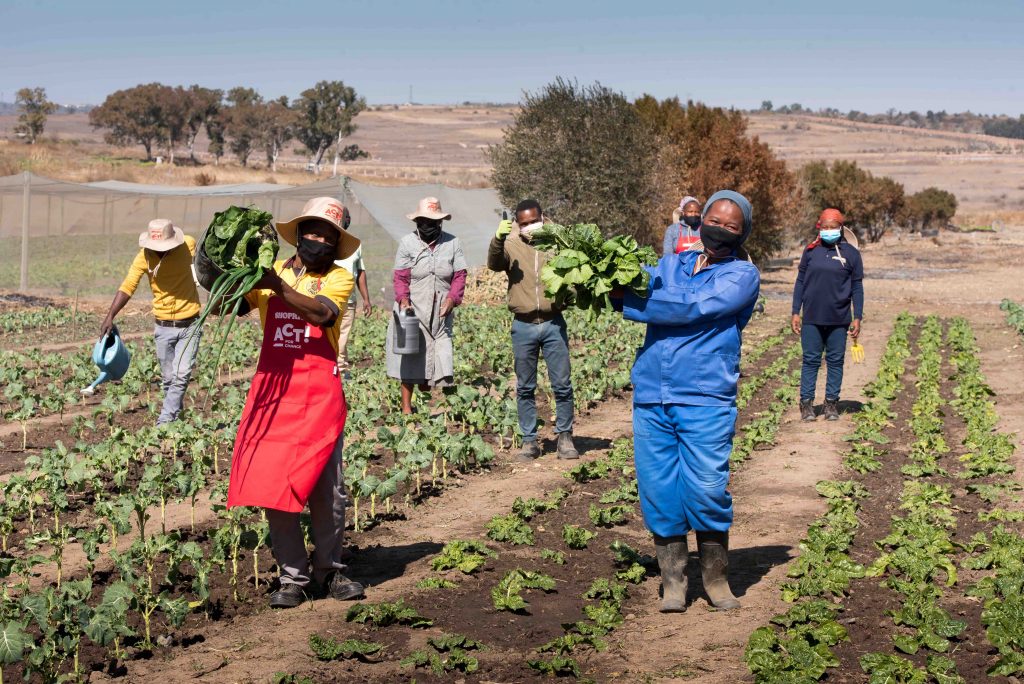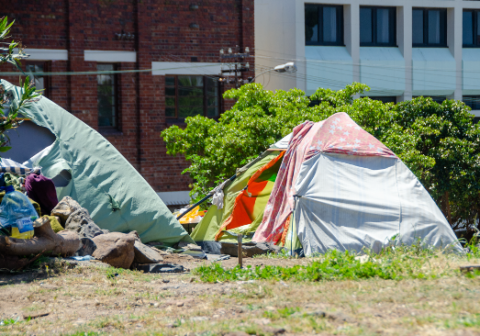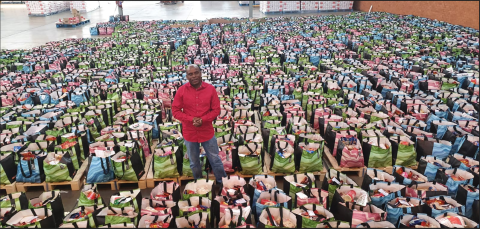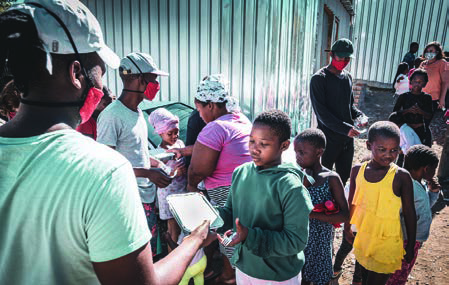Food Basket
A Multipronged Approach To Stave Off Hunger
A Black Sash report, Children, Social Assistance and Food Security reveals that child hunger is an ongoing struggle and an emotional burden and distress for caregivers and community-based support systems who look after children. To effectively fight hunger, food security should be ensured throughout the life cycle of a child from early childhood development to school-based and community-based feeding programmes, according to the report.
The Child Support Grant benefitting over 12 million South African children every month has increased to R480 from R460, but this is not enough to support a single mother and her young child, says The Black Sash.
The Black Sash recommends the implementation of soup kitchens, food parcels, on-site feeding programmes and food vouchers to help curb hunger in many communities.
Rise Against Hunger Africa
Rise Against Hunger (RAH) Africa opened its fourth branch in 2017 in East London to facilitate Eastern Cape meal-packing events and co-ordinate the distribution of locally packed meals received from Rise Against Hunger USA.
CEO Brian Nell says with the onset of the COVID-19 pandemic, they could not engage with corporate donors for meal packing, and the United States was not able to ship meals to this branch. Realising the situation wasn’t going to change overnight, they decided to close the branch.
“We’ve formed numerous partnerships with other NGOs including Zero2Five and Soul Food to assist with distribution when we have meal supplies to send to the Eastern Cape,” he says.
RAH Africa provides regular nutritious meals to early childhood development centres (ECDs) for children aged one to six years. In early 2020, Zero2Five expanded its work to the Mbizana Local Municipality in the Eastern Cape through a partnership with Rise Against Hunger Africa and Impande SA, adding 168 ECDs to their programme.
This programme reaches 4 000 children who have access to a daily nutrient-dense breakfast and three rice/soy meals per week at their centres.
“Currently, there is limited funding. Our main fundraising concept is facilitating meal packing events with donors and volunteers, which we stopped due to the COVID-19 pandemic and social distancing regulations,” says Nell.
JAM South Africa
In Limpopo, JAM South Africa (JAMSA) currently feeds 6 000 children aged between one to six years in 132 early childhood development (ECD) centres in the disadvantaged rural/informal communities of Vhembe Elim, Thohoyandou, Musina, Mopani (Giyani) and Capricorn District.
Craig Kudita, donor relations and communications officer, says the organisation’s interventions in these communities include food security and livelihoods, health and nutrition, water and sanitation, infrastructural improvement, economic empowerment and emergency response whenever a humanitarian crisis occurs.
“We don’t just provide food, we also develop learning centres to enhance education. JAMSA has also established
20 food gardens and installed 300 handwashing stations in ECD centres,” he says.
Kudita says the Complete Community Development Approach model they integrate into their programmes empowers communities while ensuring adequate health and nutrition in the targeted children.
He is not aware of other nongovernmental organisations providing nutritional support for ECDs in Limpopo. Many of these centres are funded by the Department of Social Development, but supply doesn’t meet the demand for the level of assistance currently being extended.
“Funding remains a challenge, especially given the current economic climate. We believe that if companies, individuals, government and other organisations in these areas join hands with JAMSA, we can do so much to address the challenges faced by these communities.”
Food For Life SA
Food for Life SA, which aims to eradicate hunger and malnutrition, opened a branch in Ermelo, Mpumalanga in 2000 with satellite centres in Bethal, Witbank, Middelburg, Piet Retief and Nelspruit. Other centres include Standerton, Kinross and Secunda.
Prabhupada Priya Das, organiser and the person responsible for food distribution, says since launching, they’ve managed to feed and distribute over 3 200 plates of vegetarian meals each month in different towns within the province.
“Communities always look forward to these visits. To my knowledge, we are the only one providing this kind of programme in the area. We also link up with some church organisations, hence we cover wider areas,” says Das.
Funding is dependent on donors, mostly a group of individuals, and used to cover most of the requirements. Das says they’ve been fortunate to have enough funds enabling them to meet their targets. He adds that with extra funds the programme would be able to deliver food every fortnight.
Das says they’ve approached the local municipal councillors asking for land at a reasonable price. The aim is to establish a self-sufficient centre to grow vegetables, start a small dairy farm and enterprise to ensure the sustainability of the project instead of relying on donations.
“With interventions from big companies, hunger can be eradicated, and providing a nutritious meal costs below R10 per plate on average.”
FoodForward SA
Established in 2009, FoodForward SA’s mission is to reduce hunger by cost-effectively and safely securing quality food and making it available to those in need.
It is the largest food distribution nongovernmental organisation in South Africa, with seven physical branches/warehouses in Cape Town, Gqeberha, Durban, Johannesburg, Rustenburg, Polokwane and Bloemfontein.
Deidre Adams, fund development manager, says that the organisation doesn’t have a physical branch in the Northern Cape, but still manages to provide food to communities from in and around Kimberley, Upington and De Aar.
“FoodForward SA reaches 40 000 beneficiaries daily through 63 beneficiary organisations serving the elderly, homeless, unemployed, disabled, preschool children attending community crèches, and vulnerable patients with chronic diseases, among others,” says Adams.
She says since the onset of the COVID-19 pandemic, many corporates donated to
feeding the vulnerable, however, since the beginning of 2022 many no longer support food security.
“This is hugely disappointing, as there are 30 million people who are food insecure in South Africa – that’s 50 per cent of our population. The government does not provide FoodForward SA with funding to do its work, so we rely on corporate donors,” she says.
Act For Change
Act for Change is a hunger relief programme initiated by Shoprite Holdings’ corporate social investment division. It aims to fight hunger and ensure food and nutritional security through distributing surplus food donations, sustainable community food gardens and mobile soup kitchens.
In 2009, the first two Shoprite mobile soup kitchens were launched in Gauteng and the North West. This has since expanded to 26 mobile soup kitchens, more than 160 community food gardens and over 2 500 home gardens, and surplus food donations.
“Over 450 organisations benefit from the group’s donation of surplus food, and 26 Shoprite mobile soup kitchens serve warm soup and bread to communities across South Africa daily,” says the company.
In 2021, over 570 community members were trained in sustainable food gardening, assisting them to generate an income while growing nutritious and organic food.
In the North West, Shoprite supports nine community food gardens, including Mokaila Community Project, JBF Multipurpose Primary Co-operative Limited, Nthabiseng Skills’ Training Centre for the Disabled, Retshwenyegile Home-based Care, Bakgatla ba Mosetlha, Caritas Community Centre, Maumong Community Project, Kanana Primary School and Tshenolo Primary Co-operative.
Nine early childhood development centres are also part of the programme, these include Onalerona Day Care Centre, Moremogolo Edu-care Centre, Letlhabile ll Early Learning Centre, Mphe Bana Day Care Centre, Happy Hearts Day Care Centre, Kgolagano Day Care Centre, Mmelegi Setshego Day Care Centre, Petradomas Day Care Centre, and Tlokomelo Day Care Centre. In addition, four organisations – Care 2b Kind, SAVF Rethabile CYCC Klerksdorp Children’s Home, Hand of Mercy NPO and Thakaneng Child & Youth Care Centre – benefit from surplus food donations.





